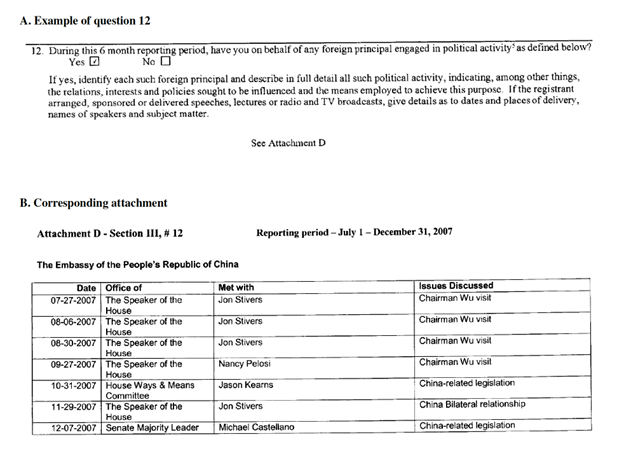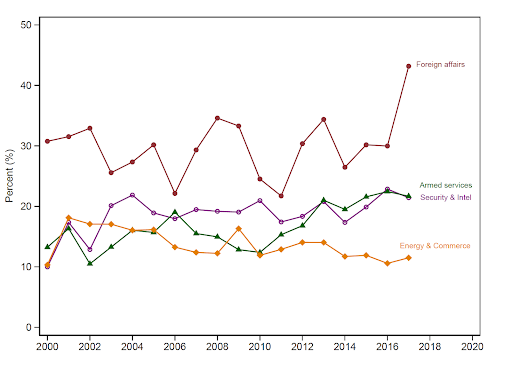In new research, Marco Grotteria, Max Miller, and S Lakshmi Naaraayanan create and analyze a dataset of more than 12,000 FARA filings to investigate the drivers and outcomes of foreign lobbying of U.S. legislators. Their findings can help inform new laws and regulations that improve government transparency and prevent the more nefarious effects of foreign lobbying.
Foreign influence in politics has emerged as a pressing concern in today’s world. The advent of globalization and burgeoning international interconnectedness has endowed foreign actors with unparalleled influence over the political landscapes of other nations, including the United States. In the past decade, foreign governments have poured billions of dollars into lobbying campaigns aimed at swaying U.S. legislators, pursuing a diverse array of objectives and yielding varied results.
The complexities of data collection pose a considerable obstacle to examining foreign influence. Consequently, large sample studies on the role of foreign lobbying and influence in U.S. politics remain scarce. In our paper, we tackle these challenges head-on by digitizing more than 12,000 filings stored at the Department of Justice. This process yields a unique dataset comprising individual meetings between foreign agents and U.S. legislators, shedding new light on the nature of foreign influence in American politics.
Our dataset is constructed from filings in compliance with the Foreign Agents Registration Act (FARA), which mandates that all foreign principals engaging in lobbying activities within the U.S. submit regular reports. A sample section of these reports is provided below. By associating each meeting with a U.S. legislator to a distinct foreign client represented by a foreign agent, our dataset encompasses more than 180,000 face-to-face meetings involving 146 foreign countries lobbying around 1,200 U.S. legislators from 2000 to 2018. This comprehensive data provides a valuable insight into the extent of foreign lobbying efforts in the U.S.
Figure 1. Sample FARA Filing

Equipped with this extensive dataset, our research investigates the factors that drive connections between foreign countries and U.S. legislators, as well as the impact these connections have on the formation of public policy and the distribution of government resources. Our data analysis offers valuable insights into the nature of lobbying relationships, informing the development of more efficient political institutions. Through our study, we have uncovered four findings that shed light on the intricacies of foreign influence in U.S. politics.
First, our research uncovers key characteristics of foreign countries and U.S. legislators that impact lobbying connections. We find that trade partnerships with the U.S. significantly influence foreign lobbying efforts, with countries having more at stake being more inclined to lobby. Additionally, visits by U.S. presidents and past sanctions also affect lobbying intensity, suggesting that countries may use lobbying to strengthen diplomatic ties or remove sanctions. Furthermore, our analysis reveals a link between a country’s history of political corruption and its propensity to engage in foreign lobbying, potentially indicating attempts to reshape narratives and enhance its international reputation.
Regarding legislator characteristics, our research reveals that foreign agents tend to engage more frequently with legislators who excel at advancing bills through the legislative process or those who are members of influential committees, such as the Congressional Foreign Affairs Committee and the Security and Intelligence Committee, as illustrated in the figure below. This observation underscores the calculated approach of foreign lobbying efforts, indicating that foreign agents strategically target legislators with the greatest potential to further their interests. By concentrating their efforts on these pivotal decision-makers, foreign agents may enhance their impact on the legislative process, ultimately achieving their desired outcomes more effectively.
Figure 2. Percentage of meetings with members of a given committee

Second, our analysis delves into the advantages foreign countries gain from these meetings. To determine causality, we utilize the deaths of legislators as an exogenous shock to foreign country connections to U.S. legislators. Our findings indicate that a higher number of meetings correlate with increased aid and assistance, as well as a greater likelihood of legislators sponsoring tariff bills favorable to the foreign country. Furthermore, we observe that meetings between foreign countries and legislators who are members of a specific committee are associated with a higher probability of a favorable bill passing through that committee or an unfavorable bill being stalled within that particular committee.
Additionally, our research investigates potential indirect benefits for foreign firms resulting from meetings between their country representatives and U.S. legislators, with an emphasis on two areas: state and local subsidies and government contracts. These indirect benefits could arise from reduced information asymmetries through these meetings or by leveraging connections to obtain preferential treatment for firms based in their respective countries. Our findings reveal that increased meetings with a legislator do lead to higher subsidies and government contracts for foreign firms, in both likelihood and monetary value.
To tackle concerns regarding reverse causality and unobserved factors, we once again employ the deaths of legislators as an exogenous shock to foreign country connections to U.S. legislators. Our findings imply that the loss of a connection with a legislator significantly decreases the local subsidies and government contracts awarded to the associated foreign firms. This new evidence highlights the crucial role of political connections for foreign firms in influencing the distribution of both federal and local government resources.
Third, our research indicates that increased meetings with legislators correlate with a higher number of foreign trips sponsored by private entities connected to the foreign country. These findings propose that such trips may serve as a valuable tool for exerting influence, acquiring policy-relevant information, or fostering legislative coalitions within domestic politics. The positive relationship between frequent meetings and extended stays in foreign countries, funded by private entities, is particularly noteworthy, as it suggests that the scope of foreign lobbying could reach beyond meetings held domestically.
Lastly, our analysis reveals that, on average, the costs borne by legislators are economically minimal. Meetings with foreign country representatives did not significantly affect the size of political contributions received from constituents or negatively impact the incumbents’ re-election chances. Instead of incurring considerable costs, it appears that meetings are arranged strategically, with both parties consenting to meet when anticipated benefits outweigh the costs. Moreover, while lobbying may divert resources to foreign governments or firms, the resulting policies could potentially foster economic growth that benefits a legislator’s constituents.
In conclusion, our study adds to the growing literature on lobbying and political influence, emphasizing the need for continued research and focus on this vital issue. We plan to make our dataset publicly accessible in the near future to help researchers investigate new questions and delve into the methods foreign countries employ to influence U.S. politics. We hope our research and data helps to inform both academics and policymakers in the design and evaluation of policy interventions that counteract potential negative effects of foreign influence. By gaining a deeper understanding of the determinants and outcomes of foreign influence in U.S. politics, we can strive to establish a more transparent and accountable political system that genuinely represents the interests of the American people.
Articles represent the opinions of their writers, not necessarily those of the University of Chicago, the Booth School of Business, or its faculty.






